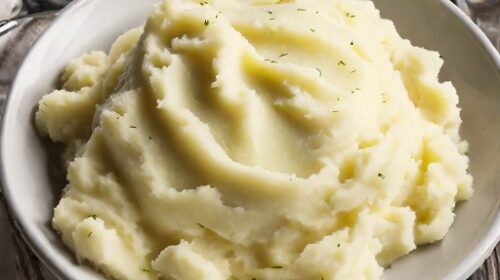Whether mashed potatoes are healthy depends on how they are prepared. Here’s a breakdown of their nutritional value and factors affecting their healthiness:
Nutritional Value of Plain Mashed Potatoes:
- Calories: One medium potato (173 grams) has around 110 calories.
- Carbohydrates: Potatoes are a good source of carbohydrates, providing about 26 grams per medium potato.
- Fiber: They are a good source of dietary fiber, offering around 2.4 grams per medium potato.
- Vitamins and minerals: Potatoes are rich in vitamin C, potassium, folate, vitamin B6, and manganese.
Factors Affecting Healthiness of Mashed Potatoes:
- Ingredients: Adding ingredients like butter, cream, sour cream, and cheese significantly increases the calorie and fat content.
- Cooking method: Boiling potatoes is healthier than frying them.
- Portion size: Eating large portions of mashed potatoes, even if they are made with healthy ingredients, can contribute to weight gain.
Overall, mashed potatoes can be part of a healthy diet when they are prepared with healthy ingredients and eaten in moderation.
Here are some tips for making mashed potatoes healthier:
- Use low-fat milk or broth instead of cream or butter.
- Add herbs and spices for flavor instead of salt.
- Mash in roasted garlic or other vegetables for added nutrients.
- Limit portion sizes.
By following these tips, you can enjoy mashed potatoes as part of a balanced and nutritious diet.
Whether or not mashed potatoes are healthy depends on how they are prepared. Here’s a breakdown:
Pros:
- Potatoes themselves are a good source of vitamins and minerals: They contain vitamin C, potassium, fiber, and vitamin B6.
- Can be a good source of carbohydrates: Carbohydrates provide energy for the body.
- Can be part of a balanced diet: When eaten in moderation and paired with other healthy foods, mashed potatoes can be a part of a healthy diet.
Cons:
- High in calories and fat: Traditional mashed potatoes made with butter, cream, and milk can be high in calories and fat, especially if eaten in large quantities.
- Loss of nutrients: Boiling potatoes can leach out some of their nutrients.
- Added ingredients: Toppings like gravy, sour cream, and cheese can add even more calories and fat.
Tips for making healthy mashed potatoes:
- Use low-fat milk or almond milk instead of whole milk.
- Add flavor with herbs and spices instead of butter and cream.
- Roast potatoes instead of boiling them.
- Limit the amount of toppings you add.
Here are some examples of how mashed potatoes can be part of a healthy diet:
- Pair them with lean protein and vegetables for a balanced meal.
- Use them as a topping for baked potatoes instead of sour cream and butter.
- Eat them as a side dish with a salad or soup.
Overall, mashed potatoes can be a healthy food choice if they are prepared in a healthy way. However, it is important to be mindful of the portion size and to eat them in moderation.




